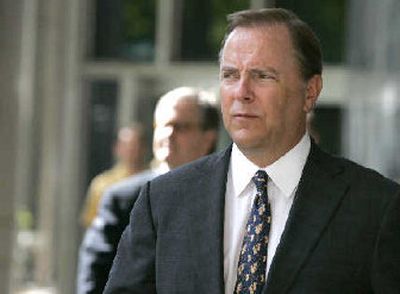Skilling has ‘nothing to hide’

HOUSTON — Former Enron Corp. Chief Executive Jeffrey Skilling denied Monday he had tailored his testimony to counter government allegations that he knew his company resorted to accounting tricks and other fraud to post impressive results.
The ex-CEO, in the 12th week of his fraud and conspiracy trial alongside Enron founder Kenneth Lay, reiterated he had nothing to hide as his cross-examination by prosecutor Sean Berkowitz began.
“I have nothing to hide, Mr. Berkowitz,” Skilling said. “I don’t think it’s a question of tailoring your testimony. I will respond to your questions to the best of my ability.”
The prosecutor sought to point out possible conflicts and inconsistencies in actions and statements by the ex-CEO, and raised one that appeared to attack Skilling’s truthfulness, though it was unrelated to the criminal counts against him.
Berkowitz noted that Skilling had invested in a photo-sharing business in 2000 and 2001 run by his ex-girlfriend, which did business with Enron. Skilling said he didn’t disclose his investment to Lay or Enron’s board, even though it may have been a violation of the company’s code of ethics.
“It may be. It didn’t occur to me,” Skilling said.
Skilling told jurors he invested $60,000 in the business, but Berkowitz presented canceled checks and a copy of a wire transfer that showed the ex-CEO invested three times that much.
“$180,000, is that correct?” Berkowitz asked.
“I guess so,” Skilling said glumly.
Skilling also told the Securities and Exchange Commission several years ago that the photo company had a $3,000 contract. When Berkowitz asked Skilling Monday if he was aware that the company did $450,000 in business with Enron, he replied, “I was not aware of that, no.”
Skilling also addressed partnerships created and run by former Chief Financial Officer Andrew Fastow that bought Enron assets and allowed the energy trading company to book earnings.
Fastow pleaded guilty in January 2004 to two counts of conspiracy for using those LJM partnerships to help Enron manipulate earnings by buying poor assets from the company while skimming money for himself from other side deals.
But Skilling has maintained the partnerships were helpful to Enron because they could conduct deals quickly and possibly pay more for assets than other bidders. He disputed Fastow’s contention that he was supposed to sign off on LJM deals along with former Chief Accounting Officer Richard Causey and former Chief Risk Officer Rick Buy to ensure Enron’s interests were protected.
On Monday he said he would have been happy to sign any approval documents related to LJM deals had they been sent to him, “and the process, I think, would have maintained its integrity.”
Causey and Buy were fired in February 2002 after an internal probe found they failed to oversee LJM deals as required. Causey was bound for trial alongside Skilling and Lay until he pleaded guilty to securities fraud in December. Buy has not been charged with any crimes.
Earlier, Skilling said his testimony was not rehearsed, though he has spent years getting ready to be his own most important witness. When asked if he has been counseled by a trial consultant on body language, communicating effectively and how to be persuasive, Skilling replied, “Communicating effectively, yes.”